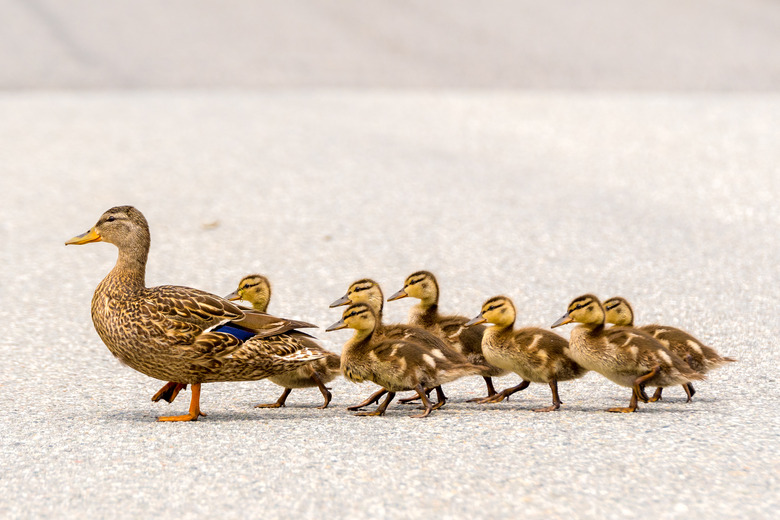Facts On Ducklings
Members of the family Anatidae, ducks are found near fresh or salt water habitats. Most ducks species breed once every year and are monogamous, but the bond between male and female often lasts for only that year. Females lay from 10 to 15 eggs and sit on them for about 28 days before they start to hatch. Ducklings spend about 10 hours in the nest before heading to the water with their mother. This is only one among other features on duckling behavior, survival and biology.
Feathers
Feathers
Unlike adult ducks, ducklings do not have waterproof down. An oil gland near the tail of adult ducks provides the waterproof cover. Ducklings get some waterproof covering from their mother's oil gland, which helps to keep their body temperature steady and helps them avoid drowning. After about two months, ducklings have feathers that enable them to fly, thus becoming independent.
Survival
Survival
In the wild, duckling mortality is higher in the first 10 days after hatching. The main factors that affect duckling survival include cold weather, lack of food, parasitic diseases and attacks from predators. Young ducks are vulnerable because they cannot fly away or swim fast enough to scape predators, such as largemouth bass, northern pike and other big fish, bullfrogs, snakes, snapping turtles, foxes, raccoons, hawks, owls and herons.
Size and Diet
Size and Diet
The size of a duckling depends on the species, but it is true that larger eggs in a clutch generally produce larger ducklings. They can feed themselves when they reach the water, but they need to learn what is edible by observing the mother. Like adults, young ducks feed mainly on small insects and tadpoles, aquatic plants and grasses.
Behavior
Behavior
Ducklings younger than 10 days tend to swim and walk as a group, always close to their mother, to avoid the attack of predators. Ducklings first recognize their mother's calling sounds, in their first days after hatching. Visual recognition is also important, but happens only later. As in other birds, in ducklings the auditory system develops before than the vision.
References
- The Royal Society for the Protection of Birds: Mallard ducklings
- Ducks Unlimited: Duckling Survival
- "Perspectives on Animal Behavior"; Judith Goodenough, Betty McGuire and Elizabeth Jakob; 2009
Cite This Article
MLA
Zinni, Yasmin. "Facts On Ducklings" sciencing.com, https://www.sciencing.com/ducklings-8542704/. 22 November 2019.
APA
Zinni, Yasmin. (2019, November 22). Facts On Ducklings. sciencing.com. Retrieved from https://www.sciencing.com/ducklings-8542704/
Chicago
Zinni, Yasmin. Facts On Ducklings last modified August 30, 2022. https://www.sciencing.com/ducklings-8542704/
